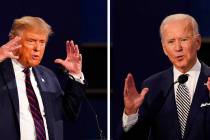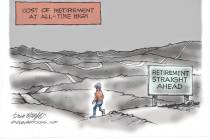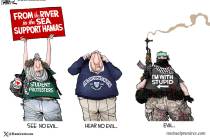Melvin and Howard: the saga that never dies
When you're not getting paid for it, fame isn't all it's cracked up to be.
Just ask Melvin Dummar.
Dummar is famous for telling the world in 1976 that -- because he once saved Howard Hughes' life -- he was named in a will allegedly written by the reclusive billionaire.
Living in Gabbs back in December 1967, Dummar said he was driving south on U.S. Highway 95 toward Las Vegas when he pulled onto a dirt road to relieve himself. His headlights revealed an elderly man lying on the ground. Dummar feared it was a corpse but when he ventured closer he realized the man was injured and freezing but alive.
Dummar helped the man into the passenger seat of his car and continued down the highway. As the man warmed up, Dummar's chatter finally drew him into a conversation and the man said that he was Howard Hughes. When they arrived in Las Vegas, the man asked Dummar to drop him off behind the Sands Hotel. End of chapter one.
Fast forward to 1976. Hughes, addicted to painkillers and in dire health, expires on an airplane en route from Acapulco, Mexico, to Houston. A frantic search for his will commences, while every kook and con artist in the country lays claim to the Hughes empire.
Now living in rural Utah, Dummar is managing a gas station when a mysterious man shows up and leaves an envelope on his desk. Dummar opens the envelope and discovers that it contains a handwritten will signed by Howard Hughes. The will states that "Melvin Du Mar of Gabbs, Nevada" is to receive one-sixteenth of the estate, later estimated to be $156 million.
Not sure what to do, Dummar delivers the will to the Mormon Church headquarters in Salt Lake City. After an expert says the handwriting appears to be authentic, the church, which is also named in the will, submits it to the District Court in Las Vegas.
A feeding frenzy ensues as the news media discover Melvin Dummar, who is granted far more than his requisite 15 minutes of fame. The story catches fire, as the public can't resist the tale of the Good Samaritan who stands to pocket $156 million. End of chapter two.
But wait: Not everybody adores Melvin Dummar. Relatives of Hughes and executives running his empire doubt his story and the authenticity of the handwritten will. They smell an elaborate ruse.
Chapter three: A jury trial is conducted in 1978 in a Las Vegas courtroom. The media hang on every word as Dummar recounts his story and other witnesses shoot holes in it. Employees testify that Dummar could not possibly have picked up Hughes on a dirt road in 1967 because the billionaire never left the top floor of the Desert Inn Hotel from November 1966 to November 1970. Others cite discrepancies in the will: It's highly unlikely, they argue, that Hughes would badly misspell his cousin's last name.
The jury rules the will a forgery. Dummar is deemed a liar who tried to cheat his way to fame and fortune. For years afterward, Dummar says, he is shunned by so-called friends and can't get a job. He has to go into business for himself to make a living. Despite the consequences, Dummar sticks to his story.
Chapter four: Retired FBI agent Gary Magnesen takes an interest in Dummar's case and investigates a variety of leads. He finds bits and pieces of information that lead him to believe Dummar is telling the truth. Magnesen publishes a book in 2005 that pulls together all his accumulated evidence.
Attorney Stuart Stein of Albuquerque, believing that Dummar has been wronged, files a lawsuit, claiming that Hughes relatives and company executives conspired to keep Dummar from collecting his rightful piece of the fortune. Dummar is back in the spotlight, and the old arguments about his story's veracity are resurrected.
Earlier this month, the 10th U.S. Circuit Court of Appeals in Denver dismissed the case, arguing that Dummar's claim was sufficiently litigated the first time around. Stein and Dummar both told me last week that they are disappointed by the ruling and plan to appeal.
"The court missed the point here and we will be filing a motion for rehearing," Stein says.
Stein contends a fraud has occurred and Dummar is a victim. New evidence -- especially testimony from retired Las Vegas pilot Robert Deiro that he flew airplanes with Hughes during the period he allegedly was sequestered at the Desert Inn -- justifies a new trial, Stein submits.
"The Hughes organization kept meticulous records of everything Howard Hughes did," Stein says. "It just is impossible to believe that they didn't know about these flights. They kept this from Melvin's lawyers 30 years ago."
Of course, the other side stands by its story. And lacking a smoking gun, Stein and Dummar are on a quixotic mission. But no matter what happens in court, Dummar, 63, is feeling a little better these days. He says in recent years he's encountered very few people who shun him or give him a hard time.
"Thirty years ago, nobody wanted anything to do with me," he says by telephone from his home in Brigham City, Utah. "I haven't met anybody in the last two or three years who has criticized me or said they didn't believe me. Thirty years ago, I had people wanting to beat me up and everything else. It makes me feel a little better."
Fame hasn't been kind to Melvin Dummar. He was the subject of a Oscar-winning movie, "Melvin and Howard," in 1980, and he even had a cameo. But he received a mere pittance from the film depicting his life.
Whether you believe Dummar's story or think he's a phony, one thing is beyond dispute: He's an American folk hero, as enduring as Davy Crockett, Billy the Kid and, well, Howard Hughes.
Geoff Schumacher (gschumacher@ reviewjournal.com) is publisher of Las Vegas CityLife, an alternative newsweekly owned by the same company as the Review-Journal. He also is the author of "Sun, Sin & Suburbia: An Essential History of Modern Las Vegas" and "Howard Hughes: Power, Paranoia & Palace Intrigue." Check out his new blog at www.howardhughesblog.com. His column appears Sunday.























